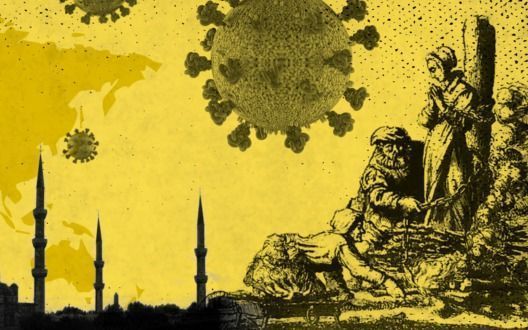How can you weapon yourself against conspiracy theories?
14-10-2022
Opinion
Jacob Hoekman, RD

Photo RD
Opinion
To get straight to the point: the existence of conspiracy theories is a good thing. That may seem a strange position to take, so some explanation is necessary. The presence of conspiracy theories is a positive thing because conspiracies do exist.
Take the conspiracy theory that the Americans invaded Iraq in 2003 because of oil and not because the country allegedly had weapons of mass destruction. This theory was strenuously denied, but afterwards, it turned out that Iraqi dictator Saddam Hussein indeed had no weapons of mass destruction and that oil did play a role.
Journalist Jakob Hoekman researches history to find answers to difficult questions related to the news
Or consider the conspiracy that US presidential candidate Nixon spied on his rival. Journalists Woodward and Bernstein unravelled that conspiracy through meticulous journalistic investigation in the 1970s, resulting in Nixon's resignation.
If you had to list all the real existing conspiracies in world history, you'd be busy for a while. Imagine that no one would have dared to think about these conspiracies. No one would have exposed them then, either. That would be terrible.
Of course, we are only talking about conspiracies about which people had developed a theory beforehand - or at least suspected. Many other plots were not seen through in time. One wishes there had been conspiracy theories about some of those conspiracies too. Then Julius Ceasar would surely not have been killed by his confidant Brutus. Then the terrorist attacks of 9/11 would undoubtedly have been prevented.
But you can also overdo developing such theories. If you suspect a conspiracy behind every government plan or a satanic plot behind every vaccination campaign, the accusation of a conspiracy has degenerated into a sort of reflex.
Such reflexes are not harmless. Just ask the Dutch politician Joris Demmink. For years, he was the top official at the Dutch Justice Department. For years, he was suspected by conspiracy theorists of all kinds of paedophile practices. None of that was proven, but his life was ruined.
Otherwise, ask the 'witches' who met their end on pyres in the Middle Ages because conspiracy theorists suspected them of performing satanic rituals.
Or, on an even larger scale: just ask Jews who, over the centuries, have had conspiracies of just about everything going wrong in the world foisted upon them. Jews are undoubtedly the biggest victims of conspiracy thinkers in the world and in history - especially in times of social crises when a scapegoat must be sought.
So, the big challenge is to stay mentally sane in a world riven with conspiracies and conspiracy theories. To navigate between real and out-of-the-blue conspiracies that split society into them and us, into our little group versus the other.
The primary medicine for this is a firmly based worldview. Someone who stands in the millennia-old tradition of the church, who knows and believes that Christ runs the world and that nothing is out of His control, is less likely to be carried away by conspiracy theories to become a new religion.
The main medicine for this is a firmly founded worldview. Someone who stands in the millennia-old tradition of the church, who knows and believes that Christ runs the world and that nothing is out of His control, is less likely to be carried away by conspiracy theories to the point of becoming a new religion.
Because that is what happens in practice, the Dutch expert Maarten Reijnders observes. He wrote the Dutch book "Complotdenkers" (Conspiracy Thinkers) and doubted whether he should have called it "De Samenzweringskerk" (The Conspiracy Church) precisely because conspiracies have a strong tendency to develop into an alternative religion. Everything that happens must fit into the limited worldview the conspiracy provides. But anchoring one's worldview in the belief that Christ is Pantocrator - the all-powerful Ruler of this world- already offers less room for conspiracies about Jewish or Bilderberg-like world domination.
A second remedy, following from the first, is to have a realistic view of humanity. This is especially true with global conspiracy theories like the one in which just about all world leaders are involved in abusing and sacrificing children.
This kind of theory assumes that these leaders are some kind of supermen. Because there is no chance that such a conspiracy could remain secret. People and governments are not as organised as these conspiracies assume. Not to simply say that governments are also just doing their best: like mere mortals, they are often surprised by current events.
In other words, if the Covid pandemic and vaccination campaign were really all deliberately conceived and executed, it would be a feat beyond normal human capability. The same goes for many population theories or plots in which all Muslim immigrants work together to make the West Islamic. The sheer numbers of people who must be involved in such conspiracies simply make it impossible for them to be true.
A third tool to avoid sinking into the swamp of false conspiracy theories is the very Reformed (and very humanist) principle of "ad fontes": back to the source. Are you willing to examine what you believe? Are you open to historical-critical source research? The philosopher Karl Popper became famous for his verification theory: you must be ready to disprove your thesis if the facts point in that direction. For example, to examine the effect of nitrogen, which led to much upheaval among Dutch farmers, you should have an open mind. If someone is unwilling to do so, that is a red flag.
Finally, what also helps is resigning yourself to the fact that there is simply a grey area in which not every stone will be left unturned. Does corona come from a lab? It is improbable, but ruling it out one hundred per cent is not yet possible.
Honestly, I find the latter remedy the most difficult to apply. Getting to the bottom of things, isn't that the job of journalism par excellence? But some stones are immovable. We only know in part right now.
This article was translated by CNE.news and published by the Dutch daily Reformatorisch Dagblad on September 6, 2022,
Related Articles






